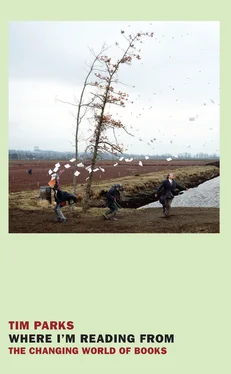One major difference between the patterns that guide Hardy’s and Faulkner’s work is the latter’s relationship with alcohol, which, more than a mere disinhibitor making courage possible, becomes a sort of courage in itself. However adventurous and ferociously provocative, Faulkner’s writing was not enough to satisfy his need to feel courageous. Throughout his life he drank epically, heroically. In the hunting camp that is the setting of The Bear we hear that
the bottle was always present, so that after a while it seemed to him that those fierce instants of heart and brain and courage and wiliness and speed were concentrated and distilled into that brown liquor which not women, not boys and children, but only hunters drank, drinking not of the blood they had spilled but some condensation of the wild immortal spirit, drinking it moderately, humbly even, not with the pagan’s base hope of acquiring the virtues of cunning and strength and speed, but in salute to them.
Whiskey and writing intertwine throughout Faulkner’s life, feeding each other, blocking each other, never allowing him to achieve any stability, always acting out a salute to other men he feared he could not resemble. By the time he was fifty the end seemed inevitable. There are only so many times one can dry out in a clinic and fall drunk off a horse. It was actually something of a miracle that Faulkner outlived his dear mother for a year before one more courageous binge, one more salute to the truly brave, as he saw it, did him in, aged sixty-four.
IV. Writing Across Worlds
“ARE YOU THE TIM PARKS WHO . . . ?”
WHAT THE POETS of the ancient world feared most was exile, alienation from their community. This was the punishment of Seneca, Ovid, Catullus, and many others. It wasn’t that they were incapable of learning another language and addressing a different audience; just that it made little sense to do so. Their work had meaning in relation to the community to which they belonged.
To what community does a writer belong today? The whole world, might seem to be the obvious answer in an era of globalization. Alas, it’s not that simple. Take my own case. I am known in England mainly for light, though hopefully thoughtful nonfiction; in Italy for polemical newspaper articles and a controversial book about soccer; in Germany, Holland, and France for what I consider my “serious” novels Europa, Destiny, Cleaver ; in the United States for literary criticism; and in a smattering of other countries, but also in various academic communities, for my translations and writing on translation. Occasionally I receive emails that ask, “But are you also the Tim Parks who . . . ?” Frequently readers get my nationality wrong. They don’t seem to know where I’m coming from or headed to.
How can something like this happen in a world where information is supposed to flow so freely? The key, I suppose, is never to enjoy huge success in any of the fields you work in. Chance, modern communications, and an urgent need to earn money can do the rest. In 1979 I married an Italian; in 1981, aged twenty-six and already writing novels that were regularly rejected, I moved to Italy. Unable to publish, I translated, first commercially, then, with a lucky break, novels. At last in 1985 a novel of my own was published in London and I began to build up a small reputation as a novelist. However, my living in Italy prompted publishers to ask me to write about the place, luring me with offers of “a great deal more money than you will ever earn with the kind of novels you write.” After ten years I gave in, writing first about the street I lived in and some years later about Italian children, schools, and families. It was great fun and all at once I was Mr. Italy.
But if this reputation made sense to the English—one of their ilk decoding another country—it didn’t attract the Germans, Dutch, and French who seemed to feel that serious novel writing was not compatible with this kind of ironic anthropology. In Germany, where my novels were outselling English editions by many times, the critics invited me to intensely earnest debates on Europe and fiction, and in general everybody felt it would be unwise to insist too much on this other material. I was now quite different people in England, Germany, and Italy, where I had begun to write newspaper articles in Italian on Italian issues for Italians, without the framing and contextualizing needed when talking about such matters to those who don’t know the country. Then, while all this was going on and for reasons I have never fathomed, The New York Review of Books invited me to write about Italian authors and books on Italy; a long collaboration began, I convinced the Review that I could also write about matters non-Italian, and my image in the USA, if one can speak so grandly, became radically different than it was elsewhere. I was an essayist.
Why do I feel this state of affairs is interesting? We think of globalization as drawing more and more people into a single community where readers all over the world read the same authors. The process is hardly new, more like an acceleration with greatly empowered means of an old propensity toward connection, communication, acquisition, appropriation, aggregation. Since earliest times communities expanded, swallowed each other up, or were swallowed, became more aware of and curious about those neighboring communities too big to beat. The writer whose community was destroyed was finished. Who would listen, even if he could speak their tongue? He was irrelevant. Others more fortunate found themselves with a larger and larger community to address: the court, the burghers, a growing group of cultured men, eventually the middle classes, and finally the people. Now there was also the possibility that somebody in another country, seeing your local fame, might grow interested, might translate your work.
Huge numbers of languages, great riches and diversity were lost in this process, which allowed larger societies to form so that eventually a single writer was in a position to speak to thousands, millions, even tens of millions. At this point writers were competing to be one of the chosen few who would enjoy the privilege of selling their work to much larger, though necessarily looser and more fragmented communities. Some began to see this as a form of freedom; not to be fatally attached to one homogeneous group, not to risk extinction as a writer if your community, your peers, rejected you. The day came when writers actually sought out exile, left voluntarily, and were proud of it. Byron, Shelley, Lawrence, Joyce—they stood outside the societies that had made them and became in their own lifetimes international figures. Yet they continued to write toward and mostly against the nations that bred them, and their international success depended on their notoriety in their home countries.
We still feel this is the normal model for literature. At the Nobel level it is very unusual to give the prize to a writer who has not already won laurels in his own country. For popular fiction, Stephen King, Dan Brown, J.K. Rowling, and Stieg Larsson all follow a similar pattern: a book is phenomenally successful at home, other countries buy into it (which can happen very rapidly now), as the sales mount up, a promotions machine gears up to support them, projecting the same image of the author worldwide as was projected at home. The effect is to sever the umbilical chord, if not the relationship, with the home community. Writers like Dan Brown and J.K. Rowling cannot be exiled. They have readers everywhere.
But globalization is not uniform and not always so kind. It can happen that a writer remains absolutely trapped in his local community, perhaps well known for a restricted group, but unable to project him or herself outside it. I think of the fine South Tyrolese novelist Joseph Zoderer, who yearns to be an international novelist and has had his work translated in some countries, but never in English, and who finds himself constantly labeled as a Tyrolese writer. To publish successfully he has to write toward this community; when he seeks to write about matters outside it, neither his own community nor the outer world are interested. Likewise there are many writers from ex-colonies or simply the developing world who find they have to address the Western world about their now distant home; publishers are immediately less interested if they seek to address other issues (I have heard this from a successful young Chinese novelist in London, and from a Surinamese in Holland). I say “have to” with the implied condition, if they want to be well and traditionally published. It is our desire for money and celebrity that binds us.
Читать дальше












